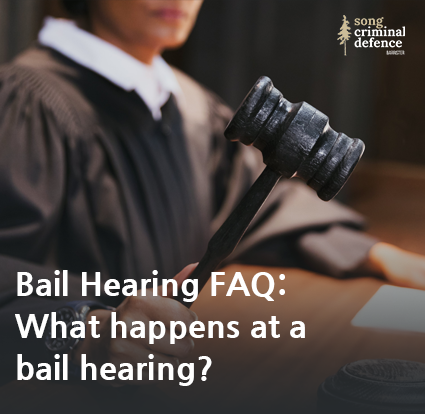Song Criminal Defence
Frequently Asked Questions (FAQs)
Q: What happens at a bail hearing?

A bailing hearing is not a trial.
It is a court proceeding, usually, in the Ontario Court of Justice to determine whether the Accused before the Court is "releasable" to the community. After an Accused is arrested, a Sergeant on duty will often determine whether or not an Accused is releasable based on what the Accused is charged with, their past criminal record, and the alleged facts of the case. If the police feel they cannot release the Accused from the station, the Accused is usually brought before a Justice of the Peace at a courthouse within that jurisdiction as soon as possible, usually on the same day they are arrested. By this point, the Accused has probably spoken with Duty Counsel at Legal Aid Ontario. This Duty Counsel would have spoken with the Accused and tried to reach out to potential sureties for the Accused, reviewed the brief synopsis with respect to the charge(s), and have spoken with the Crown "Bail Vetter". A bail vetter is usually an Assistant Crown Attorney who is tasked with reviewing all the bail files that come into the jurisdiction to determine if the Crown is agreeable to a "consent release" or is "opposing bail". A consent release means the Crown would be agreeable to releasing an Accused with a certain set of conditions by which the Accused must follow while in the community. By this point, the Defence (either a privately retained lawyer or Duty Counsel) and the bail vetter would speak and if bail is opposed, the viability of running a bail hearing on that day would be considered. Of the factors considered to name a few are: Is there a Court available to hear the bail hearing? Are suitable sureties available and ready to participate in the bail hearing?
During a "contested bail hearing"
During a "contested bail hearing", the Court considers a bunch of factors to determine three things:
- Whether or not the Accused (or their lawyer) will show up in Court when required of them and not disappear off the face of the Earth.
- Whether or not the Accused will break the law under the Criminal Code again if released or if there are safety risks in releasing them to the public.
- Whether or not releasing the Accused would make the Court and the legal system look like a joke to the public.
These three factors are usually referred to as primary, secondary, and tertiary grounds. Note that there will be accused individuals who come before the Court where there will be significant concerns with the aforementioned grounds. At this point, the Court would consider "the release plan" proposed by the Defence. This plan usually consists of answering lingering questions the Court may have in how the Accused plans to address the problems the Court has with any of the grounds. The Court may want a surety to be the "jail guard" in the community to watch the Accused to make sure they stay on the straight and narrow. The Court may even want a residential surety, meaning a surety that can live with the Accused full time to make sure the Accused doesn’t break any conditions of the release that would be given to them if released to the community. The Court may think an Accused may skip town or attend a place the Accused is ordered not to be. In this circumstance, the Defence may present a plan that includes electronic monitoring in the form of a GPS ankle bracelet. To put it simply, the plan put forth should address each potential concern the Court may have with any of the three grounds relative to the Accused. In determining this, the Defence would "call" or put on the stand the surety and any other witnesses deemed relevant such as a representative from an electronic monitoring company or even the Accused.
If granted bail, the bail conditions are read out and the recognizance of bail is drafted and signed by the Accused and the surety (if any). If denied bail, the Accused is given a next court date and taken back into custody where they will remain until the completion of the matter in the legal system (which can take months or even over a year) or until there’s a "bail review" in the Superior Court of Ontario which is akin to an "appeal" of the bail hearing.
Please give us a call at (647) 778-0031 as we are more than happy to speak to you about becoming a surety or any other questions you may have. There's no charge or obligation to hire when you reach out to us. You can also reach out to us by email at elliot@songcriminaldefence.com if that's more convenient for you.
